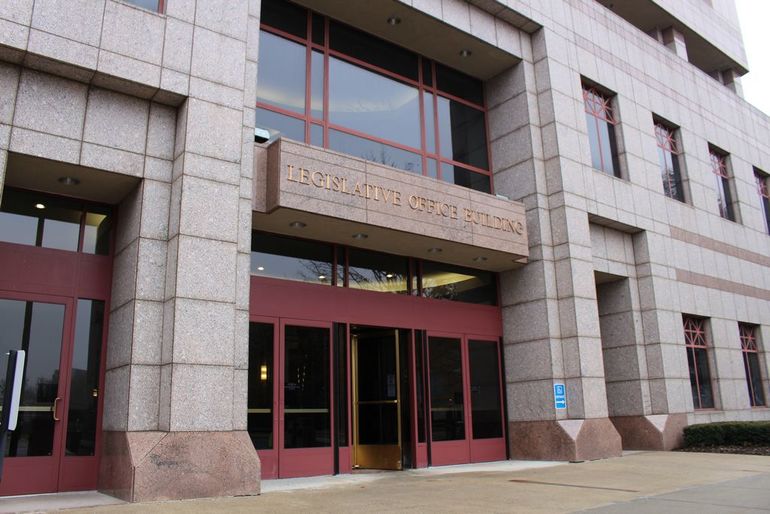Processing Your Payment
Please do not leave this page until complete. This can take a few moments.
- News
-
Editions
View Digital Editions
Biweekly Issues
- May 13, 2024
- April 29, 2024
- April 15, 2024
- April 1, 2024
- March 18, 2024
- March 4, 2024
- February 19, 2024
- February 5, 2024
- January 22, 2024
- + More
Special Editions
- Lists
- Viewpoints
- HBJ Events
- Business Calendar
- Custom Content
Lamont, legislators agree on July agenda. It doesn’t include housing segregation.
 HBJ Photo | Joe Cooper
Connecticut's Legislative Office Building.
HBJ Photo | Joe Cooper
Connecticut's Legislative Office Building.
A broadening coalition of affordable-housing advocates gathered outside the State Capitol on Tuesday to insist that the time has come to tackle housing segregation in Connecticut. But that time will not be this month.
After meeting with legislative leaders, Gov. Ned Lamont said Tuesday he intends call the legislature into special session to focus on police accountability, the wider use of absentee ballots in November as a temporary COVID-19 safety measure, cost controls on insulin and a continuation of telemedicine begun during the pandemic.
The governor’s public comments confirm what legislative leaders have been saying privately for weeks: the July special session would have a substantive, though narrow agenda. The issue of housing segregation was not raised by legislative leaders, though a second special session in September is under discussion, Lamont said.
Lamont said he intends to issue his formal call for a special session on Friday, the same day the legislature is expected to hold a virtual public hearing on police accountability — the most immediate issue raised by the death of George Floyd in the custody of Minneapolis police.
The House of Representatives is expected to convene on Thursday, July 23. The Senate would take up the bills the following week.
The General Assembly has not met since exiting the Capitol in March as COVID was taking hold on all aspects of political, commercial and social life in Connecticut. The police killing of Floyd rapidly has brought police brutality, racism and the agenda of Black Lives Matter into the mainstream since then.
Housing advocates have been trying to seize the moment, pushing a reluctant legislature to think more broadly about racism than police bias and misconduct. On Tuesday, some housing advocates indicated that they understood their agenda was a long shot for July, but it should get a serious hearing soon, perhaps in September.
“Enough is enough,” said Sara Bronin, the chairwoman of Hartford’s Planning and Zoning Commission, an expert in zoning regulations at UConn Law, and a leader with the coalition Desegregate CT. “We must tackle discrimination and segregation at one of its most insidious sources, and that is our land use system – and specifically zoning.”
Connecticut is one of the most segregated places in the country. With thousands of residents pouring into the streets to protest racism and the police killing George Floyd, this coalition and some progressive Democrats saw an opportunity to change that by overhauling the state’s exclusionary housing laws.
Although the legislature will not attempt meaningful housing reform when it convenes next week, the coalition has landed an unlikely and powerful ally — the Connecticut Conference of Municipalities (CCM), which lobbies on behalf of cities and towns — often in opposition to efforts to affect zoning.
“Our organization for years has really focused on local control, making sure that one size did not fit all, and things that, frankly, were probably a hindrance to some of these efforts,” said Joe DeLong, the organization’s executive director, who spoke during the press conference.
The killing of George Floyd helped changed that. DeLong said he was asked by officials in one town how CCM could help with police training, but he urged them to be more ambitious.
“I think the first thing that CCM needs to do is reflect on ourselves and understand whether or not we’re being a part of the solution, or we’re just being a quick path to ‘No.’ And that’s why we’re here today. We have members all across the state that have mixed views on this issue,” DeLong said. “The message that I want to deliver is don’t use us as a reason not to act. We want to be a part of the solution. We want to be at the table. We’re very committed to working through these issues.”
Many local zoning boards throughout the state rely on restrictive regulations to keep housing segregation firmly in place. They point to frail public infrastructure, clogged streets, a lack of sidewalks and concerns about overcrowding that would damage what’s often referred to as “neighborhood character.”
In Weston, which requires two acre zoning for single family homes throughout most of the town and where only 1.4% of the residents are Black, local officials are also concerned that more affordable housing will lead to more children moving to town, which will inflate school rolls and, in turn, lead to higher taxes. Enrollment in Weston schools has declined by 9% over the last 10 years and is projected to drop by an additional 4% over the next five. The district is now looking at consolidating four schools into three.
Legislative leaders and Lamont have vowed to pursue legislative remedy on a single issue in response to the protests: police accountability. But with growing demands for zoning reforms, some are adamant this upcoming special session is the legislature’s window to tackle segregation that has festered for decades.
“Housing is the center of all issues. If you are looking at a comprehensive social justice solution [to racism], doing just police reform is going to be symptomatic treatment,” said Sen. Saud Anwar, D- South Windsor, and the senate chairman of the Housing committee.
“Certain people sat in a room and made a decision to try and segregate our communities – and this is by design. And if it is by design, the design has to be fixed by the people not in a room but out here today together to stand up and say, ‘No longer will we allow this.'”
The bill drafted by Anwar mirrors the proposals pitched by Desegregate CT and includes several bold changes;
- Towns officials would have to set aside land near train stations and their town center for developers interested in building town homes, duplexes or other more reasonably priced homes (not single family residences).
- When a developer proposes building a multi-family unit, local officials will be required to hold those applications to the same standards for public hearings and special permits as those seeking to build a single-family home.
- Fees towns can levy to hire expert consultants and meet other requirements to build multi-family homes would be capped.
- Legislative leaders have not committed to raising this issue during the special session.
House Majority Leader Matt Ritter, D-Hartford, said during the press conference he supports efforts to desegregate Connecticut, but warned more supporters are needed to push members in his chamber to back an overhaul to state zoning laws.
“The only way we’re going to make real progress — and I say this to probably like-minded people — is we have to persuade people who may not think like we do at this very moment. The coalition’s got to be bigger than the folks behind us, and the folks that continuously vote on these bills,” he said.
“This bill is on our agenda. And it’s not just next Thursday. It’s not just September. It’s not just next January. We have a lot of work to do. … we all agree on a lot of these issues, the changes, go find folks who are not so sure. We’ve got to pass bills in two chambers and get it signed by the executive branch. That is the trick.”
Kevin Coughlin, the spokesman for Senate Democrats, said the caucus has proposed similar reforms.
“Senate Democrats laid out a number of proposals in our Juneteenth Agenda to tackle systemic racism, de facto segregation, and a lack of affordable housing in many communities. The General Assembly is working with Governor Lamont to determine the agendas for the anticipated July and September special sessions. Housing equity is a significant part of these ongoing conversations,” Coughlin said.
While the governor’s spokesman did not shut down the idea of zoning reforms being addressed during the upcoming special session, he pointed out it has not been the focus of the administration and that it would likely be more appropriate to tackle it when the legislature convenes in January.
“The governor remained laser focused on the issues of police accountability and absentee ballots and wants to make sure that if you’re going to bring people back to the Capitol to address far more, then it needs to be done in a very safe and organized way,” said Max Reiss, referencing the large crowd that a special session is going to generate during a pandemic. “The governor has been pretty consistent in keeping the special session t limited for the summer, but absolutely supports it being discussed in a larger forum during the regular session.”
But advocates worry the momentum to make long overdue changes will fade come January.
“We urge the legislature to take up these reforms in a special session,” said Jay Williams, the president of the Hartford Foundation for Public Giving, a philanthropic organization in the Hartford region. “With the death of George Floyd is the heightened sense … [that we] have long-standing racial equity issues affecting this country. We are long past moving to action. We urge this now “
These reports that legislative and foundation leaders are emphasizing the immediate needs for housing reform and desegregation are praiseworthy, and the legislature should attend to them rapidly. Needless to say, the issues of mass incarceration are inter-related with poverty and limited affordable well- distributed housing. Even in today’s news there are reports of other states such as Oklahoma proceeding more rapidly in de-incarceration efforts. The recent public hearings to replace state’s attorneys who are reluctant to allow sentence modification hearings are indicative that we must modernize our judicial and prison systems. This is especially true in view of grave risks posed within prisons by the COVID pandemic. (Larry Deutsch, MD MPH, Hartford)

2022 Giving Guide
This special edition informs and connects businesses with nonprofit organizations that are aligned with what they care about. Each nonprofit profile provides a crisp snapshot of the organization’s mission, goals, area of service, giving and volunteer opportunities and board leadership.
Learn more
Subscribe
Hartford Business Journal provides the top coverage of news, trends, data, politics and personalities of the area’s business community. Get the news and information you need from the award-winning writers at HBJ. Don’t miss out - subscribe today.
Subscribe
2024 Book of Lists
Delivering Vital Marketplace Content and Context to Senior Decision Makers Throughout Greater Hartford and the State ... All Year Long!
Read Here-
2022 Giving Guide
This special edition informs and connects businesses with nonprofit organizations that are aligned with what they care about. Each nonprofit profile provides a crisp snapshot of the organization’s mission, goals, area of service, giving and volunteer opportunities and board leadership.
-
Subscribe
Hartford Business Journal provides the top coverage of news, trends, data, politics and personalities of the area’s business community. Get the news and information you need from the award-winning writers at HBJ. Don’t miss out - subscribe today.
-
2024 Book of Lists
Delivering Vital Marketplace Content and Context to Senior Decision Makers Throughout Greater Hartford and the State ... All Year Long!
ABOUT
ADVERTISE
NEW ENGLAND BUSINESS MEDIA SITES
No articles left
Get access now
In order to use this feature, we need some information from you. You can also login or register for a free account.
By clicking submit you are agreeing to our cookie usage and Privacy Policy
Already have an account? Login
Already have an account? Login
Want to create an account? Register
Get access now
In order to use this feature, we need some information from you. You can also login or register for a free account.
By clicking submit you are agreeing to our cookie usage and Privacy Policy
Already have an account? Login
Already have an account? Login
Want to create an account? Register





1 Comments